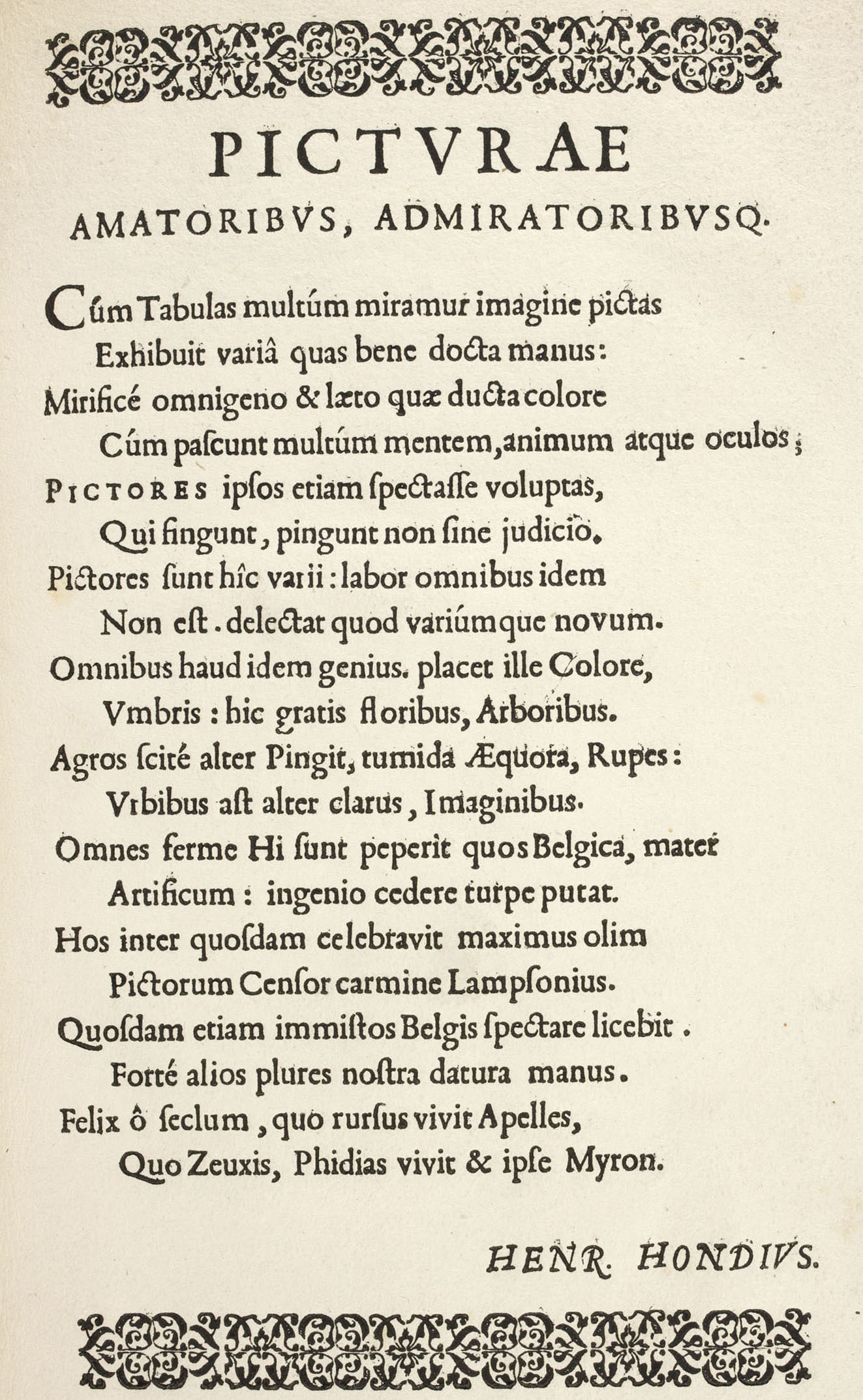Etching and engraving
19.5 x 12.2 cm
Transcription:
PICTURÆ AMATORIBUS, ADMIRATORIBUSQ.
Cúm Tabulas multúm miramur imagine pictas
Exhibuit variâ quas bene docta manus :
Mirificé omnigeno & laeto quae ducta colore
Cúm pascunt multúm mentem, animum atque oculos;
PICTORES ipsos etiam spectasse voluptas,
Qui fingunt, pingunt non sine judicio.
Pictores sunt hîc varii : labor omnibus idem
Non est, delectat quod variúmque novum.
Omnibus haud idem genius. placet ille Colore,
Vmbris : hic gratis floribus, Arboribus.
Agros scité alter Pingit, tumida Aequora, Rupes :
Vrbibus ast alter clarus, Imaginibus.
Omnes ferme Hi sunt peperit quos Belgica, mater
Artificum : ingenio cedere turpe putat.
Hos inter quosdam celebravit maximus olim
Pictorum Censor carmine Lampsonius.
Quosdam etiam immistos Belgis spectare licebit.
Forté alios plures nostra datura manus.
Felix ô seclum, quo rursus vivit Apelles,
Quo Zeuxis, Phidias vivit et ipse Myron.
HENR. HONDIVS
Translation:
TO THE LOVERS AND ADMIRERS OF PICTURES
Since we greatly admire pictures painted with varied images, which [pictures] the well-taught hand presents, and which, wonderfully drawn with every sort of joyful colour, greatly nourish the mind, the spirit and the eyes, it is also a pleasure to look at the PAINTERS themselves, who make and paint, not without discernment. Here are various painters: not all have the same task, because what is new and varied pleases.1 All do not have the same genius. One gives pleasure with colour [and] shades; another with pleasant flowers [and] trees. [Yet] another skilfully paints fields, the swelling sea [and] rocks, [while] another is famous for cities [and] images.2 Almost all these are those3 that Belgium, mother of artists, brought forth: she thought it disgraceful to yield4 [to other nations] in genius. Among these, Lampsonius, the greatest censor of painters,5 once celebrated some in verse. You will also be able to see certain men mixed in with the Belgians. Perhaps our hand will produce some more. O happy age, in which Apelles lives again, in which Zeuxis, Phidias and Myron himself live.
HENDRICK HONDIUS
Footnotes:
- “quod variumque novum: “literally the solecism “what is and various new pleases”. Cf. also note on Joachim Beuckelaer: “tabulasque culinas”.
- The most probable sense of “imaginibus” here is perhaps “portraits”.
- “Almost all these are those…”. One could also translate “these are almost all the ones…”
- “ingenio cedere turpe putat”. Cf. Anthonie Blocklandt: “Romae cedere turpe putans”.
- “pictorum censor” – the same expression at Karel van Mander, and the very similar “artis censori” at Jacob Binck, apparently of the author.


